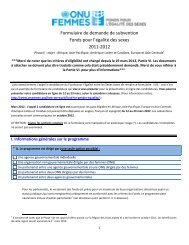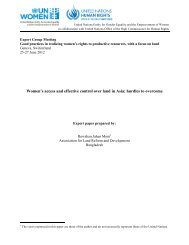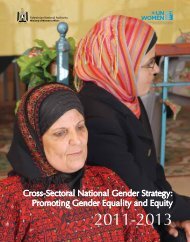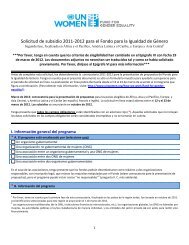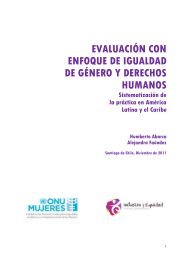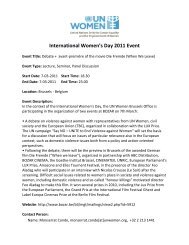Informal Justice Systems: Charting a Course for Human - UN Women
Informal Justice Systems: Charting a Course for Human - UN Women
Informal Justice Systems: Charting a Course for Human - UN Women
You also want an ePaper? Increase the reach of your titles
YUMPU automatically turns print PDFs into web optimized ePapers that Google loves.
sUMMarY<br />
14<br />
boX 4. participation of <strong>Women</strong><br />
as adJudicators in in<strong>for</strong>maL<br />
Jusice systems<br />
in many countries, customary authorities play a<br />
role in the nomination of candidates <strong>for</strong> office in<br />
parajudicial systems, with a judicial service system<br />
commission or government ministry making or<br />
approving the final appointment. it is possible to<br />
introduce affirmative action measures, particularly<br />
in parajudicial systems, as have been done<br />
with the local council courts in uganda and<br />
the Village courts in Bangladesh and Papua new<br />
guinea, where quotas <strong>for</strong> female representation<br />
have been set.<br />
chiLdren’s rights<br />
although ijs do not fully respect and protect women’s<br />
rights in many contexts, the study finds that women<br />
creatively seek a just resolution and the protection of<br />
their rights. While women may fare better in <strong>for</strong>mal or<br />
parajudicial systems, they are often acutely aware of the<br />
necessity of maintaining collective structures that benefit<br />
communities as a whole. they also face social pressure<br />
and logistical and economic difficulties preventing<br />
them from accessing the <strong>for</strong>mal justice system. thus,<br />
they often seek to change ijs structures from the inside<br />
rather than to discard them outright. engagement with<br />
ijs should there<strong>for</strong>e also be tied to raising awareness<br />
within ijs of women’s rights and of the range of choices<br />
and access available to women to seek justice, remedy<br />
and protection.<br />
there is little literature and research on children and ijs, although important issues arise regarding the rights<br />
of children in relation to ijs. children have the same basic rights as any other person in proceedings be<strong>for</strong>e ijs,<br />
including the right to be heard, the right to a fair and impartial hearing, and the right to protection from arbitrary,<br />
cruel or inhumane punishment. in practice, however, these rights are often poorly respected and are more likely to<br />
be violated.<br />
the convention on the rights of the child (crc) recognises four principles that should guide the interpretation<br />
of the other articles, and must be taken into account in all matters concerning the rights of<br />
children. they are: 1) the primacy of the best interests of the child, 2) the prohibition of discrimination, 3) the<br />
survival and development of the child, and 4) the right to be heard and to have one’s views taken into account.<br />
a number of instruments have been adopted that provide guidance on how these fundamental international<br />
standards about children and justice should be implemented. these instruments were designed mainly <strong>for</strong> application<br />
in <strong>for</strong>mal legal systems, but much of the guidance they contain is also relevant to ijs. the most relevant are<br />
the standard minimum rules on the administration of juvenile justice and guidelines on justice in matters involving<br />
child Victims and Witnesses of crime.<br />
recognition of and respect <strong>for</strong> the principles of the crc is linked, to some extent, to the type of ijs, and to the<br />
nature of the linkages to the <strong>for</strong>mal justice system. ijs that are linked to the <strong>for</strong>mal system such as parajudicial ijs<br />
often have an obligation to apply legislation as well as traditional law. such ijs including those to which cases of<br />
juvenile offenders are diverted to avoid <strong>for</strong>mal prosecution tend to have a better understanding of the rights of<br />
children and are more likely to respect them. however, links with the <strong>for</strong>mal legal system and an obligation to<br />
respect the legislation does not of itself guarantee full respect <strong>for</strong> the rights of children.<br />
in many societies, traditional values attribute little or no importance to the opinions and wishes of children, and<br />
many ijs ignore the right of children to be heard in matters that affect them. in addition, in many systems the<br />
extended family or the village community, rather than the nuclear family, has the responsibility <strong>for</strong> protecting<br />
the child. While this often serves to protect children, problems may arise when issues are brought be<strong>for</strong>e ijs. if<br />
the group responsible <strong>for</strong> protecting the child is also a party to the dispute, or participates as decision maker, the<br />
child’s views and interests may not receive a fair and impartial hearing and the outcome might not be in the best<br />
interests of the child.<br />
a stuDy of in<strong>for</strong>mal justice systems: access to justice anD human rights



